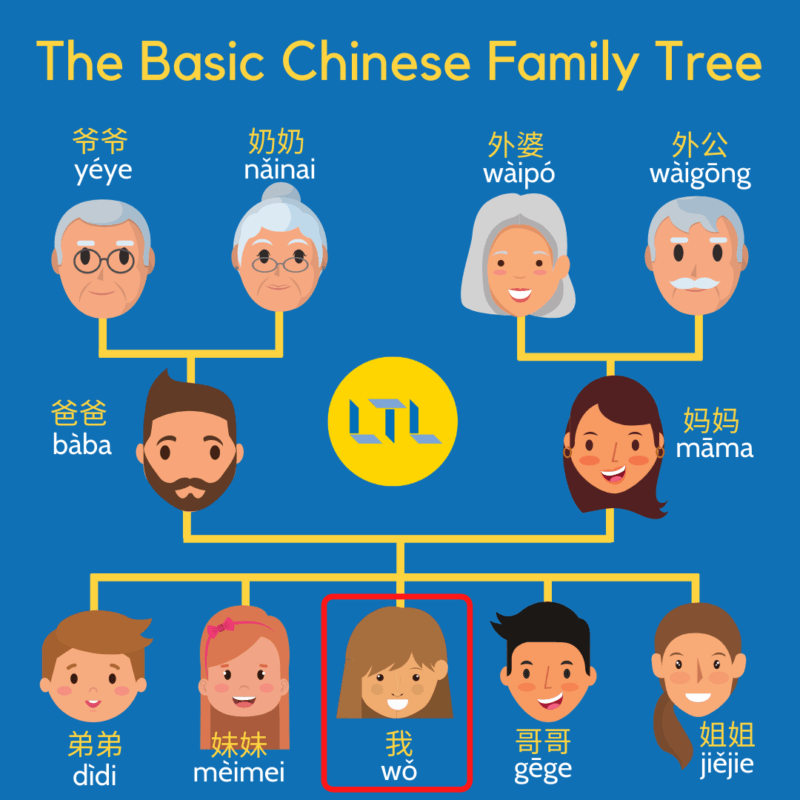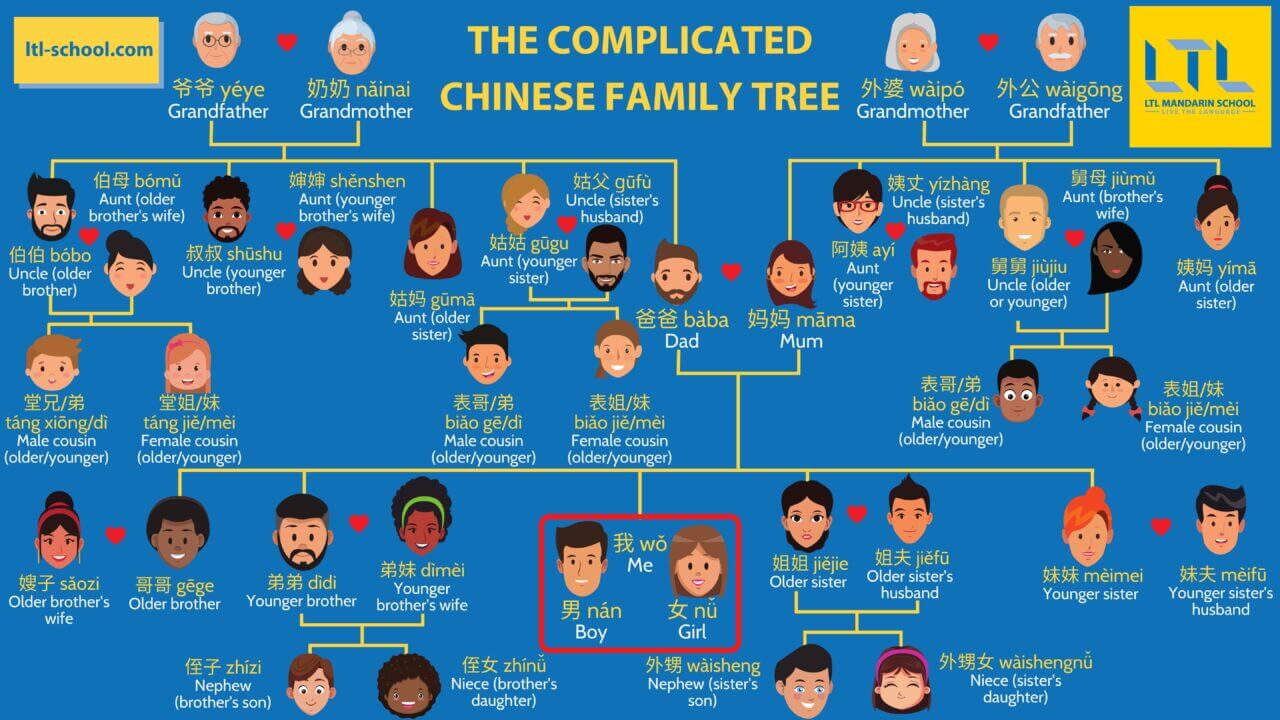How to Communicate with (and Impress) Your Chinese In-Laws
Communicate With Your Chinese in-Laws || Phrases, Tips & Tricks
We all come to China for different reasons. Some come in search of love, while others stumble upon it by chance.

Whether falling for a local was part of your China plan or not, one thing’s for sure: once the honeymoon period passes and things start to get serious, it won’t be long until you need to meet the in-laws.
This nerve-wracking milestone is stressful enough in any relationship, but it takes on a whole new meaning in China.
Here, meeting your partner’s parents suggests that marriage is on the horizon. So… it’s kind of a big deal.
If you’ve got a date with the in-laws approaching, don’t panic.
We’ve got your back with this guide on how to communicate with (and impress) your Chinese in-laws.
Chinese In-Laws || Politely Greeting Your In-Laws
Chinese In-Laws || Chinese Small Talk
Chinese In-Laws || Talking About Your Family
Chinese In-Laws || Discussing Your Personal Life
Chinese In-Laws || Answering Difficult Questions
Chinese In-Laws || Preparing to Meet Your Chinese In-Laws
Chinese In-Laws || FAQ’s
Politely Greeting Your Chinese In-Laws
As with most things in life, first impressions count for everything.
Start wowing your Chinese in-laws from the moment you step through the door with these polite greeting phrases:
- 叔叔, 您好 (shūshu, nín hǎo)
- Hello, uncle
- 阿姨, 您好 (āyí, nín hǎo)
- Hello, auntie
TOP TIP | you should use the formal ‘you’ form (您 nín) until they tell you otherwise!
If you really want to get in their good books, remember to take a gift.
This is customary when visiting a Chinese person’s house, no matter their relation to you.

So, it’s a surefire way to score some brownie points early on.
Just be careful you don’t ruin things by offering something considered offensive, and use one of these phrases as you hand it to them:
- 这是送给您们的 (zhè shì sòng gěi nínmen de)
- This is for you
- 请收下 (qǐng shōu xià)
- Please accept it

Chinese Gift Giving Etiquette 🎁 Top 5 Must Follow Tips (& Taboos)
Must Follow Rules for Chinese Gift Giving. Are thinking about buying a present for a Chinese person? These 5 golden rules (and taboos) will help you
Chinese In-Laws // Making Small Talk
Relationships form an integral part of Chinese culture and ensuring their twenty-something-plus son or daughter is in one is a priority for most parents.
In fact, it’s so important that many parents — and even grandparents — gather at weekly marriage markets (相亲角, xiāng qīn jiǎo) to promote their loved ones to passersby in the hope of securing them a match.
And they can be very picky!
DID YOU KNOW | Many have high requirements for their child’s partner, ranging from their profession and salary level right down to their height and household registration (户口 hùkǒu).
So, it should come as no surprise that your Chinese in-laws will have questions — a lot of them. Prepare for a grilling on your family background, home country and culture.



But it won’t stop there… you may be asked to reveal much more than you’re comfortable with.
Topics like how much you earn and whether or not you own a house are by no means off limits.
If this happens, just remember: they’re not being nosey; they’re just looking out for their child.
And, you don’t have to share anything you don’t want to. As long as you’re polite and friendly, they’re unlikely to hold it against you!
Here are some questions they might ask:
- 你多大了?(nǐ duōdàle?)
- How old are you?
- 你赚多少钱啊?(nǐ zhuàn duōshǎo qián a?)
- How much do you earn?
- 你工资是多少? (nǐ gōngzī shì duōshǎo?)
- What’s your salary?
- 你的国家生活水平怎么样?(nǐ guójiā shēnghuó shuǐpíng zěnme yàng?)
- What’s the standard of living like in your country?
- 你妈妈爸爸是做什么工作的?(nǐ māmā bàba shì zuò shénme gōngzuò de?)
- What do your mum and dad do for work?
- 你国家的平均工资是多少?(nǐ guójiā de píngjūn gōngzī shì duōshǎo?)
- What’s the average salary in your home country?

BONUS | For more about the Chinese family tree check out our comprehensive guide.

The Unnecessarily Complicated Chinese Family Tree 👨👩👧👧 Explained & Answered
Mandarin Chinese has a large number of words for family members. So here we help you decode the entire Chinese Family Tree in an easy to understand guide.
Talking About Your Family
While your in-laws are sizing you up as a worthy partner for their son or daughter, they’re also probably curious to find out what your family thinks.
After the initial getting-to-know-everything-about-you chat, they might ask you questions like:

- 你的家人对你生活在中国有怎么样的看法?(nǐ de jiārén duì nǐ shēnghuó zài zhōngguó yǒu zěnme yàng de kànfǎ?)
- What does your family think about you being in China?
- 你的家人怎么看你交一个中国的男友、女友?(nǐ de jiārén zěnme kàn nǐ jiāo yīgè zhōngguó de nányǒu, nǚyǒu?)
- What does your family think about you dating a Chinese guy/girl?
Even if your parents constantly beg you to settle down at home, you probably shouldn’t say it.
This your opportunity to butter up your in-laws and win their favour with your love for China.
Something along the lines of this will work wonders:
- 我的父母觉得中国很安全, 所以他们支持我在这里工作 (wǒ de fùmǔ juédé zhōngguó hěn ānquán, suǒyǐ tāmen zhīchí wǒ zài zhèlǐ gōngzuò)
- My parents think China is very safe, so they support my decision to work here
After all, how can they find fault in a glowing compliment of their homeland?

6 🗝 Benefits of Learning Mandarin in 2022 🤩 Why You WON’T Be Wasting Your Time
The benefits of learning Mandarin are probably greater than you think. Learning Chinese cna take you far in many walks of life, but how exactly?
Chinese In Laws // Discussing Your Personal Life
Continuing the family lineage is extremely in Chinese culture, so as soon as their child is in a serious relationship, your in-laws might be eager to know when they’ll receive the gift of a grandchild.
As such, you can expect to be faced with questions like…

- 你想结婚吗?(nǐ xiǎng jiéhūn ma?)
- Do you want to get married?
- 你们俩什么时候要结婚呢?(nǐmen liǎ shénme shíhòu yào jiéhūn ne?)
- When will you two get married?
- 你们怎么还没结婚?(nǐmen zěnme hái méi jiéhūn?)
- Why aren’t you married yet?
- 你们什么时候打算生孩子?(nǐmen shénme shíhòu dǎsuàn shēng háizi?)
- When will you have children?
Of course, if you’ve reached this stage, you can be confident that you’ve been accepted into the family.
But we’re not all ready to move as quickly as the in-laws would like.
So, whether you’re still not sure they’re ‘the one’, want to progress further in your career first or simply don’t want children, you’ll want to be careful about your answer.
You could try to brush it off by saying that you’re simply 顺其自然 (shùn qí zìrán) – going with the flow.

Or, if you feel like shifting the attention away from you, try suggesting you’re not sure your partner wants to marry you, and if they want to take this further, they know who to speak to…
- 我还不确定您的儿子是否愿意嫁给我 (wǒ hái bù quèdìng nín de nǚ’ér shìfǒu yuànyì qǔ gěi wǒ)
- I’m not sure if your son wants to marry me
- 我还不确定您的女儿是否愿意娶给我 (wǒ hái bù quèdìng nín de nǚ’ér shìfǒu yuànyì qǔ gěi wǒ)
- I’m not sure if your daughter wants to marry me
- 我等您的儿子/女儿向我求婚 (wǒ děng nín de érzi/nǚ’ér xiàng wǒ qiúhūn)
- I’m waiting for your son/daughter to propose to me
If all else fails, you can always hide behind the foreigner favourite, 听不懂 (tīng bù dǒng).
Or, if your Chinese is past the point of this being believable, well, good luck…
We’re kidding.
Try changing the subject with a sentence like
- 阿姨,您做的饭真是太好吃了 (yí, nín zuò de fàn zhēnshi tài hào chīle)
- This food is so delicious!
That’s sure to distract from awkward topics!

Chinese Hongbao 🧧 Everything You Need To Know About The Lucky Red Envelope
A lucky red envelope is a traditional gift for Chinese New Year. But who gets them, and how much are they filled with? We answer all the key questions.
Answering Difficult Questions With Your Chinese In-Laws
Chinese parents are naturally protective of their children, and they often have extremely high expectations for them.
As their partner, you’ll be expected to take good care of them and ensure they stay on the right track.
So, any bad habits they’ve picked up during their time away from the 老家 (lǎojiā – hometown) can and likely will become your responsibility.
They might ask you things like:

- 他/她怎么胖?(tā/tā zěnme nàme pàng?)
- Why is he/she so fat?
- 他/她经常熬夜吗?(tā/tā jīngcháng áoyè ma?)
- Does he/she often stay up late?
- 他/她经常喝酒吗?(tā/tā jīngcháng hējiǔ ma?)
- Does he/she often drink alcohol?
Whether their bad habits are ones you share or wish they’d give up, you might want to prepare an answer for it – ideally one that won’t cause an argument with your partner!
Bringing the focus back to how hard they work is a great way to distract from any further probing:
- 他/她工作好忙啊,下班后没有时间运动 (tā/tā gōngzuò hǎo máng a, xiàbān hòu méiyǒu shíjiān yùndòng)
- He/she is so busy with work he/she doesn’t have time to exercise
- 他/她工作好忙啊,经常要熬夜加班 (tā/tā gōngzuò hǎo máng a, jīngcháng yào áoyè jiābān)
- He/she is so busy with work he/she often stays up late working overtime
- 他/她工作好忙啊,没有时间出去喝酒 (tā/tā gōngzuò hǎo máng a, méiyǒu shíjiān chūqù hējiǔ)
- He/she is so busy with work he/she doesn’t have time to go out drinking
Preparing to Meet Your Chinese In-Laws
By the time you meet your in-laws, you’ll likely have already navigated a host of cultural differences with your partner.
But depending on their age and background, this may be nothing compared to what you’ll experience when you arrive in their hometown.
Do your homework on gift-giving culture and dining etiquette and brush up on your Chinese skills to give them a great first impression.
And make sure to go in with an open mind, tough skin and a positive attitude.
After all, if you’ve found the one, this will be the first meeting of many…

Your Complete Guide to Dining in China 🥢 What To Do & What TO Avoid
Dining in China || If you take a trip to China, you’ll quickly discover the differences in tastes and dishes, even if you’re ordering the same thing.
Have you met your Chinese in-laws? Tell us how it went in the comments below!
Chinese In-Laws // FAQ’s
How do I greet my Chinese In-Laws?
As with most things in life, first impressions count for everything.
Start wowing your Chinese in-laws from the moment you step through the door with these polite greeting phrases:
叔叔, 您好 (shūshu, nín hǎo) Hello, uncle
阿姨, 您好 (āyí, nín hǎo) Hello, auntie
TOP TIP | you should use the formal ‘you’ form (您 nín) until they tell you otherwise!
What questions should I expect when meeting my Chinese In-Laws?
Continuing the family lineage is extremely in Chinese culture, so as soon as their child is in a serious relationship, your in-laws might be eager to know when they’ll receive the gift of a grandchild.
As such, you can expect to be faced with questions like…
你想结婚吗?(nǐ xiǎng jiéhūn ma?) Do you want to get married?
你们俩什么时候要结婚呢?(nǐmen liǎ shénme shíhòu yào jiéhūn ne?) When will you two get married?
你们怎么还没结婚?(nǐmen zěnme hái méi jiéhūn?) Why aren’t you married yet?
你们什么时候打算生孩子?(nǐmen shénme shíhòu dǎsuàn shēng háizi?) When will you have children?
What can I do to impress my Chinese In-Laws?
If you really want to get in their good books, remember to take a gift.
This is customary when visiting a Chinese person’s house, no matter their relation to you.
So, it’s a surefire way to score some brownie points early on.
Just be careful you don’t ruin things by offering something considered offensive, and use one of these phrases as you hand it to them:
这是送给您们的 (zhè shì sòng gěi nínmen de) This is for you
请收下 (qǐng shōu xià) Please accept it
What is a good sentence to say to my Chinese In-Laws?
You can never go wrong with a compliment about the food!
阿姨,您做的饭真是太好吃了 (yí, nín zuò de fàn zhēnshi tài hào chīle) This food is so delicious!
Want more from LTL?
Want to learn Chinese from the comfort of your own home? Then our 24/7 online Chinese lessons might be the thing for you.
We offer a 7 day free trial to all new online students where you can study Mandarin 24/7.
Come and check it out free of charge and see what you think!
If you wish to hear more from LTL Language School why not join our mailing list?

















 Hi, my name is Manuel! I am from Spain and I am a Student Advisor at LTL and I’m based at our Taipei school.
Hi, my name is Manuel! I am from Spain and I am a Student Advisor at LTL and I’m based at our Taipei school. Hi, my name is Mojca! I am from Slovenia in Europe and I work as a student advisor at our Shanghai school.
Hi, my name is Mojca! I am from Slovenia in Europe and I work as a student advisor at our Shanghai school.

